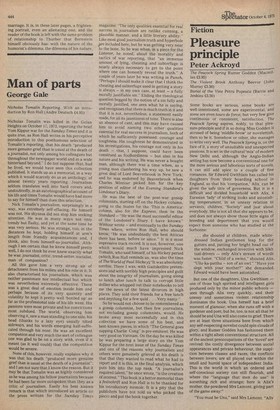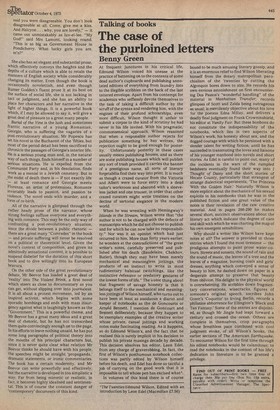Fiction
Pleasure principle
Peter Ackroyd
The Peacock Spring Burner Godden (Macmillan £3.95)
The Violent Brink Anthony Beevor (John Murray £3.50) Burial of the Vine Petru Popescu (Barrie and Jenkins £3.50)
Some books are serious, some books are well-intentioned, some are experimental, and some are even tours de force; but very few give continuous or consistent, satisfaction. The Peacock" Spring aspires, nobly, to that pleasure-principle and if in so doing Miss Godden is accused of being 'middle-brow' or novelettish, then so be it. Somehow or other, she manages to write very well. The Peacock Spring is, on the face of it, a story of unsuitable and unexpected passions. It is set in the cultural 'mix' of modern New Delhi and, although the Anglo-Indian setting has now become a conventional one for the more serious and laborious sorts of novels, it can still add spice to a couple of fine romances. Sir Edward Gwithiam has called his daughters from their boarding school ill England, so that his 'companion,' Alix, can be given the safe title of governess. But it is a difficult and divided household with Alix, a Eurasian 'lady' of striking looks and astonishing temperament, in an uneasy relation to servants, children, 'Society' and just about everybody. She is not all that she appears to be, and does not always show those little signs of breeding and deportment that you would expect from someone who has studied at the Sorbonne:
. . . she shouted at children, made whitedressed Indian gentlemen leap for the gutters and, putting her bright head out of the window, exchanged invective with Sikh taxi-drivers — only Alix's stream of words was faster. "Child of a swine," shouted Alix, "Ullu-ka-pattha son of an owl." "Have you slept with your mother?" she demanded. Edward would have been astonished.
But one of the daughters, Una Gwithiam — one of those high spirited and intelligent girls produced only by the minor public schools — sees through Alix very quickly, and their uneasy and sometimes violent relationship dominates the book. Una herself has a brief moment of glamour, when she runs off with a gardener and poet; but he, too, is not all that he should be and Una will also come to grief. There are at least three situations here from which any self-respecting novelist could spin clouds of glory, and Rumer Godden has fashioned them within a tight albeit conventional structure. All of the ancient preoccupations of the 'novel' are revived: the costly divergence between social appearances and private behaviour, the suspicion between classes and races, the conflicts between lovers, are all played out within the small and humid space of independent India. This is the world in which an ordered and self-conscious society can still flourish, and where the "language that men do use" is something rich and strange; here is Alix's mother, the powdered Mrs Lamont, giving part of the game away:" "You must be Una," said Mrs Lamont. "Ally said you were disagreeable. You don't look disagreeable at all. Come, give me a kiss. And Halcyon ... why, you are lovely," — it came out unmistakably as luv-el-lee. "My God!" said Mrs Lamont, looking round. "This is as big as Government House in Pondicherry. What lucky girls you are, m'n?"
She also has an elegant and substantial prose, which effectively conveys the heights and the depths of a culture which is able to retain the manners of English society while considerably changing its matter. Even though the book is occasionally novelettish, and even though Rumer Godden's fluent prose it at its best on the surface of social life, she is not lacking in tact or judgment, and she has an ability to place her characters and her narrative in the light of higher things. It is a powerful book which, if I may be allowed to say it, will give a great deal of pleasure to a great many people.
Burial of the Vine is the lush and sometimes frantic narrative of a young Romanian, Georgie, who is suffering the vagaries of a Post-revolutionary situation. Mr Popescu has set his novel in the Bucharest of the 'fifties, but most of the period detail has been sacrificed to chronicle the passages of Georgie's interior life. He is a serious young man and, in the natural way of such things, finds himself in a number of serious situations. He is expelled from the Communist Party and, in his desolation, finds work as a menial in a Jewish cemetery. But in the midst of death there is — if not exactly life — at least romance and Georgie meets Florenza, an artist of pretensions. Romance invariably leads to passion, and passion to violence. The novel ends with murder, and a form of re-birth.
All of the narrative is glimpsed through the rather heady prose of the narrator, whose strong feelings suffuse everyone and everything with romance. This may be the only way of confronting a post-revolutionary situation, since the divide between a public rhetoric — there are a great many "Comrades" in the book — and private suffering will never be resolved on a political or theoretical level. Given the novel's context of composition, and given its admittedly sensational content, it is possible to suspend disbelief for the duration of this short book and to dive willingly into its European bravura.
On the other side of the great revolutionary debate, Mr Beevor has loaded a great deal of 'reality' into The Violent Brink, a first novel which steers as close to documentary as you can get, without slipping over into journalese. It is all about a protest movement, led by an inspired activist, which begins with some sporadic bombings and ends with mass insurgency .against what is laughingly known as the "Government." This is a powerful theme, and Mr Beevor has a great many ideas and a great deal of rhetoric, but he has not transcribed them quite convincingly enough on to the page. In his efforts to leave nothing unsaid, he has put some long paragraphs of political theory into the mouths of his principal characters but, since it is neVer quite clear what relation Mr Beevor thinks he should have with his people, the speeches might be straight 'propaganda,' dramatic statements, or ironic commentaries. The book has a certain modernity, and Mr Beevor can write powerfully and effectively, but the narrative is developed in too simplistic a way. Far from being mimetic or realistic, in fact, it becomes highly idealised and sentimental. This is of course the constant danger of 'contemporary' documents of this kind.



































 Previous page
Previous page